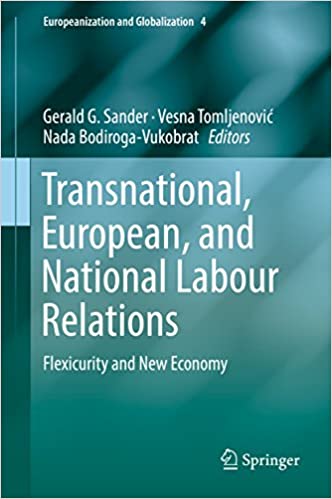Transnational, European, and National Labour Relations (PDF) applies an innovative approach to explore the topic of flexicurity and correlated changes in the working world, the importance of which for the general economic and social development is gradually being recognised. It emphasizes on the changing nature of work and its impact on EU law and national labour and social security laws. Though the transformation of institutional and regulatory frameworks of labour relations follows different patterns in different EU Member States, it is nonetheless a common phenomenon that offers an excellent chance for mutual learning experiences and comparing notes on best practices.
Using these ideas as a opening point, the ebook presents a collection of research on several aspects and implications of changing labour relations in the EU Member States. The intial chapters address the internal market dimension of the transformation of employment relations by investigating how integration of migrant workers, social dumping, and cross-border mergers influence national labour policies and laws. The ebook further analyses terminological and linguistic challenges in the field of labour law in the EU’s multi-lingual legal environment. Following chapters cover various theoretical and practical issues, like the impact of chain-liability regulatory models on the legal situation of workers in subcontracting networks, and modern work arrangements in the collaborative or ‘gig’ economy. Other chapters are devoted to issues of jurisdiction and law applicable to separate employment contracts, together with alternative resolution mechanisms in labour disputes. The next section provides fresh insights on and a critical overview of the well-known Dutch and Danish models of flexicurity, often mentioned as role models for reforms of labour markets in other EU Member States. Three individual chapters explore specific aspects of flexicurity in Croatia, in terms of individual dismissals, life-long learning and the influence of non-standard employment on future pension entitlements. One paper scrutinizes temporary agency work in Germany as an important instrument of flexicurity, while another discusses numerous forms of work used in Slovenia in the context of flexibilization of work relations. Several challenges still lie ahead, and the primary aim of this ebook is to provide a solid basis for informed future discussions.
NOTE: The product only includes the ebook, Transnational, European, and National Labour Relations in PDF. No access codes are included.



Reviews
There are no reviews yet.